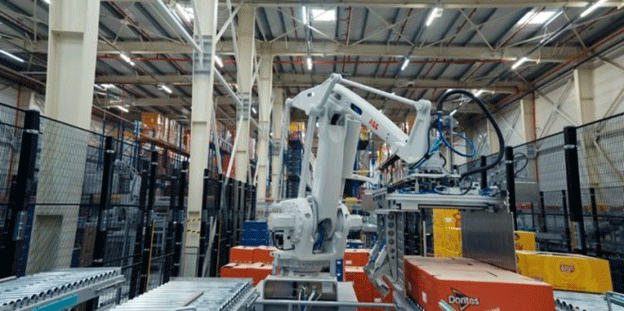In a significant development for the snack food industry, PepsiCo has recently inaugurated a state-of-the-art automated warehouse at its Popești-Leordeni facility in Romania. This $100 million investment project, which was first announced in 2022, not only enhances production capacity but also reinforces PepsiCo’s commitment to sustainability and regional growth.
The $100 Million Investment: A Comprehensive Overview
The centerpiece of this strategic investment is the new automated warehouse, which represents an expenditure of $33.5 million. This 32,500 square meter facility features a 34-meter-tall high-bay storage area designed to manage up to 23,500 pallets. The warehouse is engineered for high efficiency, capable of processing up to 320 pallets per hour. Here’s a detailed look at what this investment entails:
1. Expansion of Production Capabilities: PepsiCo has added three new production lines to the Popești-Leordeni factory as part of this investment, bringing the facility’s total annual manufacturing capacity to 39,000 tons. This increase allows PepsiCo to meet growing demand across 17 countries, including major markets such as the Czech Republic, Slovakia, and Greece.
- Capacity Increase: The factory now operates with an expanded yearly production capacity of 39,000 tons, up from previous levels, which supports an extensive distribution network across Central and Southeastern Europe.
- Distribution Reach: The factory supplies snacks to 17 countries, demonstrating its significant role in PepsiCo’s regional supply chain.
2. State-of-the-Art Warehouse Features: The new automated warehouse boasts advanced technological features aimed at optimizing efficiency and sustainability:
- Automated Systems: The warehouse’s automation systems streamline operations, increasing efficiency and accuracy in inventory management.
- Energy Efficiency: A 700 kWp photovoltaic panel system provides the warehouse with renewable energy, reducing reliance on external power sources.
- Environmental Impact: By optimizing operations, the warehouse is projected to cut greenhouse gas emissions by around 500 tons annually and reduce the need for over 9,000 transfer trucks.
3. Strategic Significance: According to Radu Berevoescu, General Manager & Senior Commercial Director East Balkans at PepsiCo Romania, this investment is more than a facility upgrade—it’s a step towards transforming the Popești-Leordeni site into a central hub for Central and Southeastern Europe.
- Centralized Operations: The new warehouse consolidates operations, streamlining processes and creating a strategic regional hub.
- Operational Efficiency: The new infrastructure enhances inventory control and reduces operational costs, aligning with PepsiCo’s pep+ sustainability agenda.
The Future of PepsiCo’s Operations in Romania
PepsiCo’s investment in the Popești-Leordeni facility reflects a broader strategy for growth and sustainability. Over the past decade, PepsiCo has invested $320 million in Romania, focusing on expanding production capacities, improving sustainability practices, and strengthening its role as a regional production hub.
1. Ongoing Commitment to Romania: PepsiCo’s decade-long investment history in Romania showcases a deep commitment to the country’s economic development and the establishment of a robust production network.
2. Long-Term Sustainability Goals: The company’s investment aligns with its pep+ (PepsiCo Positive) sustainability agenda, which aims to reduce environmental impact, promote sustainable agriculture, and enhance community well-being.
3. Future Developments: Looking ahead, PepsiCo plans to leverage the new facility to meet increasing demand and explore new market opportunities, especially focusing on expanding their footprint in both established and emerging markets.
PepsiCo’s $100 million investment in the Popești-Leordeni snack factory marks a significant advancement in their production and sustainability efforts. The new automated warehouse not only enhances the factory’s production capabilities but also supports PepsiCo’s environmental and economic goals through advanced technology and energy-efficient solutions. As PepsiCo continues to expand its operations and market reach, this investment sets a benchmark for future developments in the snack food industry.







